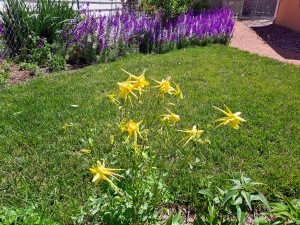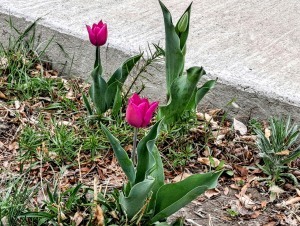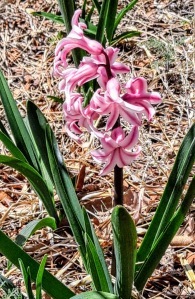Pat Bertram's Blog
July 20, 2025
Cosmic Thoughts
I just finished reading a science fiction novel about an alien civilization that set out to destroy the earth, and there was no way for us to stop it. Instead, there was a Noah’s ark scenario, where certain people, plants, animals, and a sampling of cultural items such as books were sent out into space. In itself, it wasn’t that great a story, but it did make me wonder what is here on earth that would truly be important to save if the planet were to be blown up. If there are other livable planets, they would have their own plants and animals that grew out of their own ecosystem. And if the planets were inhabited with sentient creatures, those beings would have their own culture and language, and anything from Earth would be merely a curiosity.
I can see where Earth’s trappings would be important to displaced earthlings, but is there anything here that is valuable or necessary on a cosmic level? If the planet and all its inhabitants were to be blown up by some earth-shattering (literally, earth-shattering) event, would the universe be diminished?
I can think of many things that are valuable to the earth and especially to those that abide on its surface, but I can’t think of any physical thing that’s necessary on a cosmic level. Personally, of course, I value many things. Reading, occasionally visiting with friends, working on my yard. None of these things would survive my demise (let alone the demise of the earth), probably not even my yard since it takes too much work, and people nowadays don’t seem to value that sort of outside experience.
Still, working in the yard has been a good experience for me. And for some reason, this year the yard seems to respond. From certain angles, it looks like a lovely mini park.
From other angles, it looks like a jungle.
I planted a few vegetables in my raised garden (one pumpkin, one watermelon, one zucchini, two tomatoes) and those plants are lush!
The zucchini was supposed to be the normal dark green garden squash, but somehow I ended up with an heirloom zucchini — a costata. A special treat, for sure.
This is also lily time.
I’ve had quite a sampling of blooms despite so many of the plants freezing in the early spring.
The lilies always come as a surprise.
I had no idea such perfection was available to the casual gardener.
Although not actually lilies, I’ve also had day lilies growing.
All this growth and color helps to mask the plants that didn’t come back this year. Also a touch of detachment helps to accept that so much of gardening is beyond my control.
Although taking care of my yard isn’t necessary on a cosmic level, and certainly wouldn’t survive a cataclysmic event, it’s something special on a personal level, and that’s all to the good.
Wishing you well.
***
Pat Bertram is the author of Grief: The Inside Story – A Guide to Surviving the Loss of a Loved One.
June 10, 2025
Detachment
As you can probably tell from my lack of posts for the past couple of months, I’m losing my emotional involvement with my yard. Usually spring offers plenty of gardening photo opportunities, but lately I tend to just look and pass on by rather than document the beauties I see. Oh, I’m still doing the yard work, still waiting to see what blooms, still taking some pictures, but I’m doing so at a degree or two of separation. I’m not exactly sure why I started losing my enthusiasm. Perhaps because of the difficulty of keeping things green and blooming in this dry and sometimes harsh environment. Perhaps of a general feeling of detachment from life and a sense of the passing years. Perhaps because of . . . who knows.
Oddly, even though it hasn’t been that hot compared to previous springs — we’re just now getting up into the 90s — and even though I’ve been keeping up with the watering, the sun is so intense that the grass is already burning and flowering plants are wilting. I feel as if I should care, but I don’t, not really. Or maybe it’s that I don’t want to care. It does take a lot out of a person to plant flowers and greenery and tend them only to watch them struggle.
In a way, it’s not that big of a deal. I can replant grass and flowers and other vegetation. Or I can plant something else in the place of plants that don’t make it. For example, I had one large swath of grass left from the original sod I’d put in, but half of it died over the winter. (Which is odd in itself since all the rest died in the summer heat.) I couldn’t decide whether to replant the grass come fall or plant something else. In the end, I planted wildflowers instead of leaving the dead grass, and if I decide I want the grass, well, autumn (the best time to plant grass around here) is still a long way away. For another example, half of my ice plant that has spread so rapidly over the years also died in the winter, but I was able to replant.
So, not a big deal, but still . . .
I make it sound as if my garden is failing, but the truth is, it was prettier this spring than ever before.
Plenty of flowers planted themselves, such as the red poppies, and the larkspur. Other plants spread nicely. And some not so nicely. (I try to stay away from flowers that take over, but that’s not always easy to control since what should grow here doesn’t always and what shouldn’t sometimes does.)
This is always a rather unpretty time of year, which adds to my disinterest. The summer flowers haven’t yet budded. The larkspur is finished flowering but hasn’t yet gone to seed, so it makes the garden look rather drab. Once the larkspur and other self-planted annuals are finished, I can then replant so that August and September will be nice, but now it’s just a matter of keeping the yard — and me — going.
It’s funny — I waited all winter for this and now?
I’ve been sitting here thinking, wondering about that “and now?” and I have no response to that.
I have a hunch that once we settle into summer, I’ll be okay. Hot, but okay. There’s been just way too many weather changes lately to suit my poor aging mind and body — cloudiness and humidity and sprinkles of rain followed rapidly by sun and heat and then a repeat of the cycle.
At least I will have plenty of work to do outside to keep me occupied. In fact, I better close this off and go mow the grass.
Wishing you well.
***
Pat Bertram is the author of Grief: The Inside Story – A Guide to Surviving the Loss of a Loved One.
April 11, 2025
Tulip Envy
In a garden, as in life, envy is not a good thing. One can appreciate the object of that envy, though one must be sure to be grateful for what one has, not what one wishes one had.
That’s cryptic, I know. Or rather, it would be if not for the title of this piece. Tulip envy. Yep. That’s the truth of it.
I was at a friend’s house the other day and was gobsmacked by the sight of her tulip garden. I stood there, frozen with awe, drinking in that vision. Except for photos in gardening magazines, I’d never seen such perfect tulips, such vibrant colors, such an awesome display of floral pulchritude. To say I was envious is . . . well, it’s redundant considering I’ve already mentioned the envy part a couple of times. (Just so you know, all the photos in this blog are pictures of my tulips.)
That’s when I realized it’s okay to be appreciative, but it’s not okay to compare. Her tulip garden is decades older than mine, so it’s had time to mature. It’s in the shade, which around here is necessary since the sun, even on cool days, tends to be intense. (And one of my tulip gardens is always a bit sickly since it gets more sun than the poor things can handle). And anyway, seen for what they are, each of my little displays is perfect.
Another thing I learned is that what you get is what you get. So much of tulip gardening in the dry high plains is a matter of weather and hence beyond our control. This year, for the first time since I’ve lived in this house, we had heavy snows at the beginning of November, followed by a few half-hearted snowfalls rather than the reverse, which is what we usually get. Because of that early snow, tulips that lay dormant last year burst forth with color this year. Even my poor sun-drenched garden put forth a few lovely blooms.
So, I’m celebrating my blooms. Focusing on that which is right beneath my feet.
At least when it comes to tulips, that is. What else is right beneath my feet is an incipient forest. A couple of springs ago, my neighbor’s ash tree flooded my yard with an inch-thick coating of seeds. I cleaned them up the best I could. Twice. (Because there was a second seed flood shortly after the first.) As it turns out, whatever conditions produced tulips this year also produced ash seedlings. Dozens and dozens of them. I can’t just let them be, can’t pull them up like weeds because some of those root systems are a foot deep, can’t kill them because I’d also kill the surrounding ornamental plants. So . . . dig, dig, dig.
And then, boo hoo, some of my newly sprouted lilies froze in the last frost. Something else I had no control over. They were eager to start growing during the warm days, but the poor things conked out during the frigid months.
With all that going on, it’s truly much better to concentrate on my lovely tulips!
***
Pat Bertram is the author of Grief: The Inside Story – A Guide to Surviving the Loss of a Loved One.
April 9, 2025
Just One Word
Tulips!
***
Pat Bertram is the author of Grief: The Inside Story – A Guide to Surviving the Loss of a Loved One.
March 27, 2025
Fifteenth Anniversary
I wasn’t sure if I wanted to post a grief anniversary blog this year. It seems as if after a certain number of years, one should stop counting, but we do always count birthdays, wedding anniversaries, and other milestones, and Jeff’s death was a huge milestone date for me, so perhaps counting is still acceptable.
If that’s the case: today is the fifteenth anniversary of that painful date.
To be honest, this isn’t an especially noteworthy day. Well, except for the near-record temperature. 86 degrees! It will cool down to normal temperatures in a couple of days, so I took the opportunity to do various outside chores, such as mow the grass, pull a few weeds, maybe fertilize (I say “maybe” because I’m not sure how well the dispenser I attached to the hose works). I even took a very short walk. (Those days I had to spend on the computer updating my email address wreaked havoc on my knees, and they’re still not working as well as I hoped.) And I visited with a neighbor in the middle of the street.
In a way, I suppose, all those normal activities do make this a noteworthy day. It wasn’t that long ago that I had no plans, no place I wanted to be, nothing I particularly wanted to do. But the years passed. And here I am.
Oddly, that’s about all I have to say about this anniversary. There’s no real vestige of grief left, though I do still feel his absence, more of a vague feeling that something’s missing than the gaping hole I used to feel. Those times when the missing is more than a vague feeling, I talk to him, which helps bridge the gap. I’ve also noticed that I still dream about him, but not in any message-from-the-dead sort of way. He’s just part of the lexicon of my dreams, forgotten when I wake along with all the rest of what went through my sleeping mind.
I did get a flower today, only the second bloom in my yard so far this spring. A fitting reminder that life goes on.
***
Pat Bertram is the author of Grief: The Inside Story – A Guide to Surviving the Loss of a Loved One.
March 24, 2025
Subverting Stereotypes in The Wheel of Time
Last night, I spent a considerable amount of what should have been sleeping time looking for bad reviews of the last three books of The Wheel of Time series. After the death of the real author, the series was finished by a stand-in author, who did an execrable job, and I wondered why none of those books rated less than a three-star review on Amazon.
One reason, I discovered, is that a lot of people give him kudos for doing a thankless job, but it wasn’t thankless. He got paid for his work, and those books helped catapult him into the fantasy-writer stratosphere.
Another reason is that he writes in a simplistic style that appeals to today’s readers — short sentences; quick scene changes; lots of action; little real character development; not a lot of depth, emotional or otherwise. All of which is antithetical to Robert Jordan’s writing.
I also tend to think a lot of the acclaim he gets for his Wheel of Time books is because they are in direct contrast to Jordan’s books. There is no doubt that Jordan’s last few books could have used some heavy editing (though oddly, one of the substitute author’s acclaimed books is more or less a replay of the Jordan book that people tend to hate) but much of what people seem to object to in Jordan’s writing are things that shouldn’t be an issue.
For example, when Jordan started writing The Wheel of Time books, there were few female protagonists in that genre. This lack makes sense in a way because the writers of high fantasy tended to be male. Also, the genre seemed to attract more males than females in the beginning (or at least it was assumed to be so). Writing a male protagonist was safe — females will read books written by and for males more often than the reverse.
Jordan tried to turn this assumption on its head, writing both male and female protagonists. He tried to balance the power between males and females, and he tried to subvert stereotypes. It surprised me to discover that so many people think his writing is sexist, though in a world of his own making, with sexual dynamics of his own making in that world , how can he possibly be considered sexist?
One of the problems is that his readers are so young. (I have yet to discover a group of readers my age, online or off, who have any interest in reading the books let alone discussing them in any depth.) These younger generations don’t realize there was a time not that long ago when women were considered gossipy, flighty, unable to handle finances, and needed to be looked after as if they were children. In fact, it wasn’t until 1974 that women could obtain credit cards in their own name without a male co-signer. At the same time, it became illegal for mortgage companies to refuse loans to unmarried women as had been common.
It was only a handful of years after these major real-world changes that Jordan started thinking about his series. In his attempt to subvert stereotypes, he reversed things — women in his series consider men to be gossipy children who don’t have any sense, so the women think nothing of bullying the men to get them to do what the women think is right. Making things more complicated, in Jordan’s world, men are raised to be chivalrous, putting women’s safety first, and protecting them even if they don’t want the protection. This leads to an underlying theme of the story — men don’t understand women, though they try to. Women don’t understand men, though they think they do.
Adding further to this complicated dynamic, the “magic” system had become one-sided. It used to be that both men and women could tap into the power that drove the universe, so they were equals. But during the time of the story, only women were able to use the power, so it threw the balance off.
And yet readers try to fit today’s mores into Jordan’s world.
What really made me stop and think during my research last night is that most of the people in the United States today became adults after those life-changing laws governing women’s financial autonomy came into play. If only 20% of people were born before 1964, then that means 80% never had to deal with (and probably never had to learn about) a fairly recent time when things were so terribly unbalanced in the real world. No wonder so many Wheel of Time readers haven’t a clue what that particular theme of Jordan’s was all about.
In the end, I suppose it doesn’t really matter why the substitute author gets lauded for his awful writing. In my world, those books no longer exist, so unless I can come up with my own ending, the series ends with the real author’s death.
***
Pat Bertram is the author of Grief: The Inside Story – A Guide to Surviving the Loss of a Loved One.
March 23, 2025
Occupying My Mind
This March seems interminably long, though I don’t really know why. I’ve had spurts of activity, such as the celebrations for my house anniversary (six years!) as well as an occasional visit with friends. I haven’t spent much time outside, and there really hasn’t been any reason to. After the first shy crocuses showed their faces, there hasn’t been much change in my yard. Some of my grass is greening up, some looks dead, though I hope it’s just slow coming out of dormancy. In any case, I threw out some grass seed, but it looks as if the birds are eating it despite the feast the neighbors provide for them. And then there’s the wind. The least said about that the better! Coincidentally, today’s blog prompt from WordPress is “What is your favorite kind of weather?” One thing I can tell you, it’s not wind!
You’d think as slowly as this month is passing, I’d be more aware of the days as they come, but the first day of spring passed me by. It’s possible the upcoming fifteenth anniversary of Jeff’s death might pass me by, too, though I doubt it. Even if it does, the actually date no longer makes a difference. He’s still a factor in my life, as is his absence, but not as much as either used to be. Surprisingly, I still sometimes feel a tightening behind my eyes, but it never gets to the point of tears or even sadness. Just an acknowledgment that once he was a big part of my life and now he’s not. I still talk to him occasionally, mostly about things I can’t really talk to anyone else about. Silly things, like my thoughts about The Wheel of Time books.
Yep, still rereading those dang books. I’m on my second reread this year. It’s gone beyond reading to studying, since for every page I read, I spend twice as much time online finding out about the books, such as the real-life influences of the story. Lots of myths, legends, religions, philosophies come into play. Lots of very obvious King Arthur references. It amazes me how long it takes some people to make those correlations, if they ever do. In fact, the author’s wife/editor supposedly didn’t even realize the connection between the book’s mystical sword in the Stone (the Stone in the story is a fort) with Excalibur until she was writing the blurb for one of the books.
I’m also trying to figure out the real ending. Robert Jordan died before he could finish, and the guy they got to write the last books wrote something — I don’t really know what it is that he wrote. Despite the use of the characters and setting of Jordan’s world, those last books bear little relationship to Jordan’s cosmology. The savior character was supposed to be more of an Arthurian savior rather than a Christian one, but we got a Christian one that completely subverted the premise laid out in the first eleven books. What shocked me is that on none of those last three execrable books is there a rating below three stars on Amazon. There are some one- and two-star ratings on Goodreads, but those ratings are for the entire series. (Which makes me wonder, if those raters hated the books that much, why did they bother to read them? Four million words is a huge commitment, and not something you undertake if you hate the books.)
Another thing I don’t understand — Jordan had a team working on the books: his wife/editor, a continuity editor/research assistant, and a keeper of the timeline. Why didn’t all these people prepare a synopsis for the replacement author reminding him of each character’s arc and a brief compendium of what forces are ready to face the last battle, and where they all were on the timeline? One of the very many problems with those last books is they completely ignore any character growth and start over from scratch. Another problem is they ignore the fact that Jordan had already maneuvered the major forces into place for the last battle. I suppose I wouldn’t be as challenged to find the real ending if at least those books had some sort of internal consistency, but they don’t. Thousands of words are spent on one character deciding — yet again — to be a leader. Along the way, he forged a hammer (borrowing one of the pseudo-author’s gimmicks from his own books.) But then the character never leads in the last battle. He took his followers to the battlefield and then went off and did his own thing. Nor did he use that ridiculous hammer in the last battle. Huh? And readers never even noticed? That in itself should get a rating demotion. Quite frankly, I have never been able to read anything by that author, and he lives down to my expectations.
Somewhere in all those words Jordan wrote, there must be clues to the real ending. I suppose finding that ending is as good a use of my time — and brain power — as any. I’m thinking of using one of my defunct blogs for setting out the clues as I find them rather than bore you with the saga, but who knows. I could always tag the posts with The Wheel of Time moniker so you can ignore them if you wish. And anyway, the winds might die down, spring might come, my grass might grow, my flowers might bloom, and so other things will occupy my mind.
***
Pat Bertram is the author of Grief: The Inside Story – A Guide to Surviving the Loss of a Loved One.
March 1, 2025
Look What I Found!
I was walking around my yard today, enjoying a bit of sunshine, and look what I found!

Such a glorious ending to a few not-so-pleasant days. Oh, I’m fine, there’s nothing really wrong, I’ve just had to deal with changing my primary email address as well as wherever I used that email for online sites. This change wasn’t by choice and I’m not happy about it, but it was necessary.
A few years ago, the free email that was provided by my website domain provider was changed to a paid Outlook account. I was so daunted by the idea of making the change, that when I got a good deal on Outlook, I went ahead and paid ahead for several years. (Money that is now wasted.) I’ve gradually been changing over as I open new accounts or lose friends or whatever, but last week Microsoft informed me I would have to download an authenticator to my phone so I can continue using the email account. The bizarre thing is that this particular email was never able to be downloaded to my phone, and the authenticator doesn’t work for PCs, so they were demanding something utterly unnecessary. I was supposed to have two weeks until the authenticator was mandatory, but since I knew how discouraging the whole process would be, I started immediately to do the work. Good thing. Instead of having two weeks, I ended up with a single week. Luckily, I think I got everything, and if I didn’t, I will just have to presume it’s not important.
Along the way, as I had to update accounts, I ended up deleting one or two. Pinterest, for example. I never did understand that site, and when I tried to update the email address, they wouldn’t do it unless I provided a date of birth. I gave a fake one, of course, then when I was finally able to access the site, I deleted the whole thing.
At least, that was easy. Worse, I found two places for my online banking where I needed to change the address but alerts still went to my old address. I had to call to the bank to get them find the third place. Both the gas company and the internet company had those same issues. One important account had nowhere to change the address, so another call. And then, of course, there were all those places where I used a different email address but used my primary one for backup.
With any luck, I made all the changes, but oh! What a mess!
Then, considering that Microsoft was the company that put me in this situation, I decided I needed to back up all my pictures and documents elsewhere in case they do the same thing with that email. I had used OneDrive to back up my previous computer just because it was an easy way to move them to my new computer. (Which, come to think of it, is now elderly in computer years.) And then, because I was in a snippy mood, I ended up deleting photos and documents I haven’t looked at in years. (Snippy meaning not happy, snippy meaning feeling like snipping things away.)
So, finding those sunny crocus faces beaming at me this morning sure made my day brighter.
***
Pat Bertram is the author of Grief: The Inside Story – A Guide to Surviving the Loss of a Loved One.
February 8, 2025
Whatever Comes to Mind
I’m trying to get back into blogging, starting with perhaps one blog a month, but the problem is the same one I’ve had ever since I stopped blogging every day — nothing to say. That didn’t stop me all those years of being a dedicated blogger — I just wrote whatever came to mind.
And what’s coming to mind, after seeing those dashes in my first two sentences, is that supposedly, if you see a lot of dashes in text, it’s probably written by an artificial intelligence (though if it’s artificial, can it be intelligent? Doesn’t intelligence signify a mind or at least a brain?). I might not be an artificial intelligence (might not even be much of a natural intelligence anymore for that matter), but I do tend to use a lot of dashes. And parentheses.
To be honest, I don’t see the point of using computer “intelligence” programs to write. The point of writing is to be yourself, to dig the truth from somewhere deep inside, and it seems that using those programs buries the truth deeper. Besides, the point of reading is to meet mind to mind. It’s an utterly human ability — to perceive in one’s own mind via twenty-six symbols something that someone else conceived in their mind. Anything else is just . . . words. Drivel.
Even worse, as artificial intelligence works today, it’s basically a form of plagiarism. Of course, people can take that plagiarized writing and rework it so that it’s not exact, in which case it’s not legally plagiarism, but it’s still morally plagiarism.
I think about this a lot lately as I am re-re-re-re-rereading Wheel of Time books. There is no way that series could ever have been written by any an artificial intelligence, or even a minor natural intelligence. Written to appeal to the young readers of fantasy, Robert Jordan layers his story with so much depth that the series can be read and reread dozens of times and always a different tier of meaning can be found.
From my first reading, I’ve been ambivalent about the books. For one thing, I’m not a fan of fantasy. For another, a good number of those millions of words could be whittled away to make the story stronger. (That’s what happens when your editor is also your wife — too much dross is left intact.) A good number of scenes and even chapters could have been left off without any loss to the story. Or maybe not since readers seem to differ on what those unnecessary scenes are. Luckily, there is a thing call skimming text or even skipping chapters. But the bulk that is left intact, is sheer genius.
As I wrote before, the scope of the story is utterly astounding. In the story-world, during the so-called age of legends, people wielding the power that turns the wheel of time, broke the world. Mountains grew where no mountains had been, waters flooded lands, green spaces became deserts. And humans started over. Interestingly, breaking the world is exactly what Robert Jordon did when he wrote his series — he smashed our world into bits, mixed it all up — legends and traditions; countries and races, clothes and customs; myths and mysteries, religions and philosophies — and put it all back together into his own creation. Truly fascinating.
It’s because of these books that I know for a fact that Google’s experimental AI overview is not to be taken as truth. So often, if I have a question about the books, the overview is not accurate, probably because it forms answers from authoritative sources as well as opinions proffered in fan discussions — and there are a lot of those discussions. (As to why I have questions, it’s hard to keep track of a story that has maybe 2,782 named characters with 1,379 of those being point-of-view characters.)
I’m sure this essay doesn’t seem to tell you what’s going on in my life, though it really does. With winter limiting my choices, I spend my days with simple pursuits such as computer games, painting-by-numbers, reading (and this year, so far, what I’ve been reading is The Wheel of Time.)
I am lucky (and exceedingly grateful) there is nothing much to write about. I am as safe as possible, as healthy as possible, as happy (or at least as contented) as possible. I hope the same for you.

***
Pat Bertram is the author of Grief: The Inside Story – A Guide to Surviving the Loss of a Loved One.
January 8, 2025
Update
After an early heavy snow, followed by higher than average temperatures, we’re now in a deep freeze. Later in the week, the temperatures will get above freezing, although only fleetingly.
And then all too soon, it will be time to work out in my yard again.
I enjoy these months of respite from the struggle against weeds and sun-dried grass, but I miss the daily gifts — the flowers that come up despite this harsh climate, the volunteer plants that so tenaciously take a stand, the perennials that stretch their territory. I do get a flower fix with paint-by-number kits. It’s not the same as real gardening by any means, but it’s a real boon to someone without an artistic bone in her body.

Oddly, what I don’t miss is writing — about gardening or anything else, for that matter. For almost three decades, writing (and blogging) was my life. It kept me going during the long years of Jeff’s ill health and in the dark times after he died. It gave me a reason to get up in the morning, gave me a focus that I might not otherwise have had. In fact, because of this blog, I went on excursions and attended events I might have passed on, but I figured anything I did gave me a topic to write about.
So did my desire to stay at home squelch my desire to blog? Or did my lack of desire to blog squelch any desire for venturing out? Silly questions. Silly because the answers don’t matter. I’ve become a homebody, and that’s it. My being a homebody is not surprising since I’ve always had reclusive tendencies, but what is surprising is that I have a home. And a garden! It still astonishes me that this place is mine. In my restless years of grief and its aftermath, I spent a lot of mental energy trying to figure out what my unshared future would be like, and never once did I come close to imagining this reality.
I remember back then occasionally thinking that my future should be wonderful, because if the pain of grief was something I never knew existed, then there had to be some joy to come I also never knew existed.
And now here it is. And now here I am.
Of course, that raises a conundrum that I try not to consider: the only reason I’m living this particular good life is that Jeff is not here. Still, the last thing Jeff ever said to me was that everything would work out for me, so I know he’d be pleased for me. And yet, there’s that niggle in the back of my head that I try not to think about.
But those are thoughts for another time.
Today I’ll think good thoughts and be grateful for all I’ve been given.
***
Pat Bertram is the author of Grief: The Inside Story – A Guide to Surviving the Loss of a Loved One. “Grief: The Inside Story is perfect and that is not hyperbole! It is exactly what folk who are grieving need to read.” –Leesa Healy, RN, GDAS GDAT, Emotional/Mental Health Therapist & Educator.
































